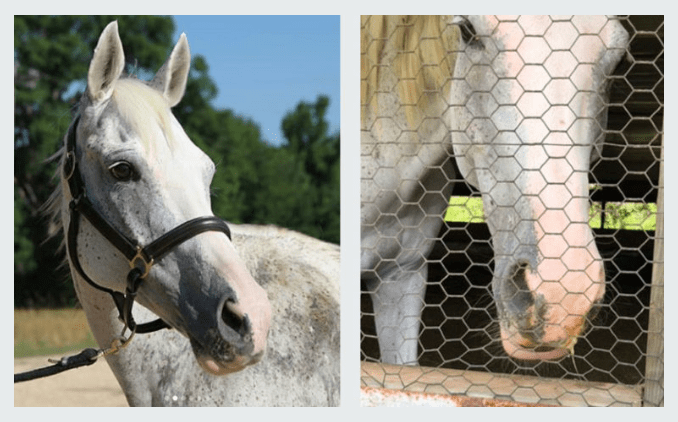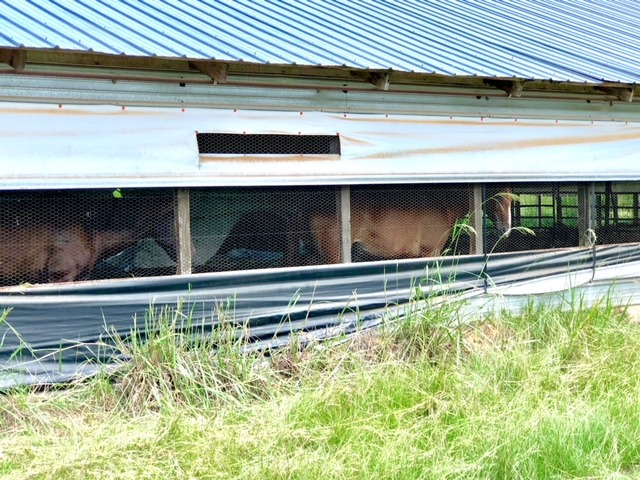
$5,000. That’s more than the average cost of caring for the average horse for an average year. And that’s the penalty Dina Alborano and her ICareIHelp rescue foundation agreed to pay to the State of New Jersey seen here, the penalty for accepting more than $10,000 in donations without registering for non-profit tax-exempt status in the state. The collective opinion on social media is: Not enough. Not even close.
Alborano was also ordered to permanently cease operations of ICareIHelp, whose website states eight months into operations they had stopped rescues because they had stopped taking donations. She was also banned by the state from serving as principal, board member or
trustee of any other charitable organization, and barred from any “unfair or deceptive acts or practices in the conduct of any business in the state.” But that’s just in New Jersey. There are 49 other states. And Alborano is not precluded from owning horses. Alborano’s Standardbred mare, Happilyeverfaster, won race 3 on January 10 at Freehold Raceway.
In examining ICareIHelp’s financials it was discovered the organization had taken in over $344,000 in donations between November 2017 and December 2018. No financial records for ICareIHelp were released with the Consent Order (document link can be found here) therefore only $17,000, the balance in
the ICareIHelp bank account, was accounted for in settlement documents. That amount was reportedly donated to an unnamed registered 501(c)(3). This was settled as a civil matter and there are no criminal investigations or charges pending by the New Jersey Attorney General’s Office for fraud regarding
the collection and misappropriation of the $344,000 or any other issues. It’s also unknown if there are taxes due on collected monies, penalties and/or any investigations being conducted by the IRS. PastTheWire received no response to phone calls and emails to the Attorney General’s Office for further information.
By Alborano’s own account she had taken in over 100 “rescued”horses in that 13-month time period. However, the Union Parish Sheriff’s Office is in possession of a spreadsheet from an anonymous source containing detailed information about 181 horses tracked through
ICareIHelp on social media that includes the status of each horse, sadly, the majority dead.
The horses Alborano claims ICareIHelp rescued were placed in quarantine in a facility she helped set up with Hal Parker in Farmerville, Louisiana. This was the chicken coup facility first reported in Paulick Report.
The horrific conditions at Parker’s facility, first brought to light by PR’s Natalie Voss in April 2018, were further revealed in August in an exposé http://ntwo.org/updates/2018/the-battle-for-louisiana-dina-alborano-and-horses-at-risk/ by Victoria Keith, President of the National Thoroughbred Welfare Organization (NTWO). Keith chronicled case-by-case alleged rescues that turned into a living hell and inhumane death for these horses.
Parker also kept dozens of horses at the property of friend, Shawn Alford. Alford, a former Union Parish prosecutor now in private practice, said she let Parker bring his rescues there because it would help keep the grass trimmed on her ranch in Marion. A video seen here given to Union Parish investigators in January 2019 revealed partially decomposed horses, rib cages, horse skulls and leg bones strewn across patchy grass on Alford’s land. Alford later told the detectives that “she knew of three horses
that had died on her property and she stated she called and texted Hal repeatedly to come and bury them, but he failed to do so.” Alford was retained to represent Parker upon his arrest in February.
On February 11, 2019, a tipster reported a fallen horse on Parker’s property. When deputies arrived they found Leo Frosty Girl, a 17-year-old bay mare, on the ground struggling. She was humanely euthanize later that day. A week later, three deputies and an inspector with the Livestock Brand Commission, an
investigative arm of the state Department of Agriculture and Forestry, arrived with warrants. What they found startled them. The pine trees had been completely stripped of needles and bark. Among the barren trees were sick and emaciated horses. They also found bones on the backside of Parker’s pasture. Authorities pulled nine horses in distress off the property.
Parker was arrested on February 19, 2019 and sat in a Louisiana county jail for six months on five counts of animal cruelty held on $250,000 bond, later reduced to $155,000. He appeared in court April 3 and pleaded not guilty to two felony counts of aggravated cruelty to animals and one felony count of theft of
livestock involving a horse. Two misdemeanor counts of simple cruelty to animals were dropped by the court against Parker. Although authorities tracked down the one horse, Felonious Friend, illegally transported to Arkansas, theft of livestock involving a horse could not include Federal interstate transportation RICO charges because the value did not exceed $5,000.
Nine additional aggravated cruelty to animals charges were added on April 16 and served on Parker who was still being held in the parish detention center at Farmerville. Seven of the charges were related to malnourished horses and the remaining two were for horses that died because of complications from suspected malnourishment. Bond on the nine new charges was set at $110,000 raising total bond to $265,000.
In May, Parker was charged with two more felony counts of animal cruelty related to two horse whose harrowing stories have been chronicled by their new owners on social media —Lucky Pierre and Revielle, both adopted by veterinarians and both near death upon arrival. Parker, now free on bond, awaits a status hearing on 14 felony charges on March 6, 2020.
Criminal charges have yet to be filed in Louisiana against New Jersey resident Alborano and ICareIHelp however when asked if this was a possibility a Union Parish Sheriff’s spokesperson said they could not comment on an ongoing investigation. The investigation stretches across several states.
PastTheWire could not confirm if other state or Federal jurisdictions had become involved with the investigation. According to a report in NOLA.com, Union Parish investigators said they’re also investigating whether Parker or Alborano doctored photos of the horses they advertised online — which could result in more charges. It is also unclear if any charges can be brought concerning the business practices of the rescue
operation.
Dr. Odom, the veterinarian who examined the horses for Parker and Alborano, remarked that Parker just took on too many horses and was overwhelmed. Parker claims Alborano stopped sending money and he was unable to purchase food for the rescued horses. Alborano claims she just wasn’t able to get to
Louisiana often enough to know what was going on. While fingers pointed in more directions than there are on a compass, horses were starving in chicken coups and being shipped sick to multiple states. But by many accounts, the majority were just heartlessly left to starve and rot.
All of the horses that were rescued by Alborano came from Jacob Thompson’s kill pen in Pitkin, Louisiana. Thompson purchased the horses at Dominique’s livestock auction and resold them to Alborano for a marked up price. Alborano claims she was aware of the markup but didn’t care because she wanted to get the horses out.
Alborano told NOLA.com that she was inspired to create her ICareIHelp rescue after seeing Thoroughbreds on Thompson’s Facebook page in 2017 and being “haunted” by the images. Between November and December 2017, ICareIHelp collected $12,000 in donations.
Thompson was inspired in 2014 to post Thoroughbreds for”adoption” on Facebook when he saw an increased value in that marketplace. At 33-40 cents on the pound an average horse is worth about $350-400 to a Mexican abattoir. But a horse-lover online would be willing to pay $1,000 to “bail” that same horse out of a kill pen.
Thompson has a conviction out of Texas for livestock theft, and in October 2018, Louisiana authorities fined him $1,000 for failing to properly dispose of horse carcasses on his Pitkin lot. A month later, a state board in Louisiana used Thompson’s Texas conviction to refuse him a new commercial livestock dealer’s
license. Thompson appears undeterred by these civil penalties.
Louisiana State agriculture officials have also become involved, taking some initial steps to block Thompson from dealing in horses — with little immediate impact. Just this week Thompson had several Thoroughbreds with racing plates listed on his Facebook page. Facebook refuses to remove kill pen pages like Thompson’s although they receive a multitude of complaints. To counteract this groups and pages were created such as Justice For Kill Pen Horses.
Thompson comes from a family of livestock brokers. In July 2019, Vernon Parish prosecutors filed 18 counts of animal cruelty against his father, Gary Thompson, over the neglect of 18 horses that authorities seized in March.
In 2016, the FBI added animal cruelty to the National Incident- Based Reporting System (NIBRS) list of Class A Felonies.
However, this is for tracking crimes not for investigation or prosecution. Laws vary state-to-state on animal cruelty. To date just over a dozen state consider animal cruelty a felony.
ICareIHelp is not an isolated case. In every state where there are horses there is abuse. Where ever there is racing, horses will be cast aside. And greedy people will be lurking to take advantage. Stop the demand for horses in livestock auctions and these types of rescues may disappear.
There is a pending Federal bill, the Safeguard American Food Exports (SAFE) Act, that would prohibit the slaughter of horses in the United States for human consumption, but more importantly, the export of live horses for the same purpose. The US Food and Drug Administration currently bans the presence of 379 common equine drugs in animals slaughtered for human consumption. However, there is no procedure in place to ensure that American horses, sold to slaughterhouses and killed for human consumption, are free of these FDA-banned substances.
When horses are sold, especially through an auction, there is no required transfer of information regarding the substances they received during their lifetime. Therefore, there is no mechanism in place to ensure horses
frequently bought at auction by kill buyers have not been given dangerous substances before they become part of the food chain.
If you donated to ICareIHelp or shared their information with others, don’t feel bad. You were only doing what you thought in your heart was right. Now we all need to do what’s right. Change the mindset in racing and keep racehorses from ever getting into kill pens requiring rescue in the first place. We will get justice for horses.
Photos:
Left: Bid My Valentine on June 8, 2018.
Right: Bid My Valentine on August 17. Photo by Vickie Coomber
taken at the chicken coup, Marion, LA.
Both photos courtesy NTWO

One of two chicken barns at the Parker facility where horseswere housed.
Photo taken Aug. 17, 2018, courtesy NTWO

Hal Parker (left) and Dina Alborano in Marion, Louisiana. Photo from Dina Alborano social media.




